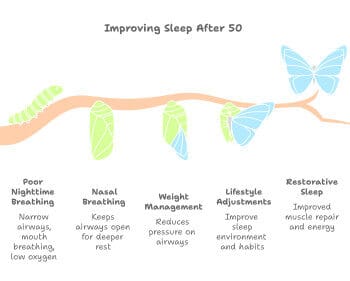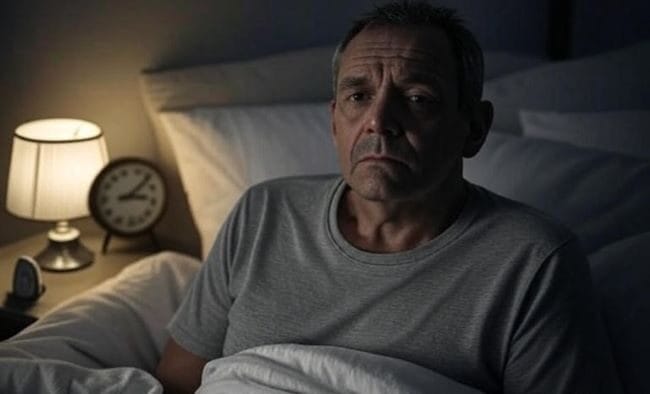As you get older you’ve likely noticed your sleep getting worse but don’t know why. You might wake up feeling unrested or struggle to fall asleep for what seems like hours at night. This isn’t just a reflection of getting older. It relates to underlying issues with your health and poor habits and is why sleep gets worse after 50.
These issues could include changes in hormones, changes in breathing patterns and a continuation of poor habits from your youth. This results in a messed-up sleep cycle, difficulty recovering fully after a night of sleep, and a lack of energy due to interrupted sleep.
While you aren’t getting younger, you can turn around your sleep by making a few changes. These changes can result in much better sleep and a more energized, sharper day that follows.

Age Related Sleep Changes in Men After 50
You’re not only getting less sleep but the quality is also getting worse after 50. Men experience:
- Less deep sleep – You spend more time in light stages of sleep and less in slow-wave “Deep” sleep. That’s why you wake often at night and don’t feel fully refreshed in the morning.
- Weaker circadian rhythm – Your internal clock becomes weaker with age which messes with your wake times – leading to earlier mornings and impacting night time sleep – causing you to wake more frequently
- Trouble cooling down – Body temperature doesn’t drop as easily and as naturally as it should which results in this inefficient cooling process preventing you from falling asleep quickly.
- Adenosine changes – This chemical builds during the day to create strong sleepiness. With age your brain receptors to adenosine may become less sensitive and not as effective in causing sleep. This, combined with late afternoon caffeine further blocks adenosine, making sleep even more difficult.
Together, these age-related sleep changes explain why sleep begins to feel lighter and less satisfying. The challenge isn’t just getting to bed—it’s rebuilding and strengthening the rhythm and depth that make sleep restful and restorative.
| DID YOU KNOW Some older men experience up to a 50% drop in deep, restorative delta sleep compared to their 20s [x]. |
How Melatonin, Cortisol, and Testosterone Affect Sleep
Our hormones change as we get older. These changes have a direct impact on how we sleep:
- Melatonin decreases– Melatonin is the hormone that tells your body it’s time to rest. As you get older your body makes less of it. This causes a weaker sleep signal, making falling and staying asleep harder.
- Cortisol rhythm changes – Cortisol should be high in the morning and low at night. When you’re young, cortisol increases a lot in the morning to help you wake. I also decreases a lot at night so you can sleep. As you get older, it increases less so and also decreases to a lesser extent, leaving you with less energy in the morning and restless at night, making it harder to stay asleep.
- Testosterone declines – Testosterone supports muscle repair, recovery, and energy levels. As testosterone decreases with age, sleep quality is impacted. Inadequate sleep then decreases testosterone even further, creating a declining cycle.
Changes in hormones as we age can explain why men over 50 feel tired and get poor sleep. Healthy habits and routines can help restore deeper, more restorative sleep.

How Breathing Impacts Recovery and Sleep After 50
The way you breathe has a huge impact on sleep quality. Most men over 50 don’t realize this even though changes in their airway and their lifestyle make things worse.
- Narrower airways – Being male, getting older and gaining weight, combine to contribute to narrowing airway space. This makes snoring and sleep apnea more common, both causing frequent awakening and low blood oxygen levels.
- Mouth breathing – Breathing through the mouth causes your mouth and airways to dry which increases the chance of airway collapse by increased air resistance. This also decreases oxygen delivery. With nasal breathing the airways are kept open and moist, which results in greater oxygenation and deeper sleep.
- Lower oxygen exchange – Poor, inefficient breathing means your body gets less oxygen filled breaths, impacting restorative sleep. This causes you to wake up drained of energy, even after 8 hours of sleep.
- Recovery slows – A night of poor breathing reduces your body and brain’s ability to restore themselves to a healthy state. This also means the immune function has not been able to work as well as it should with proper nasal breathing.
While breathing is automatic, doing so properly so as to maximize your health is not either considered or understood. With small adjustments you could wake up refreshed and alert rather than groggy and weak.
| DID YOU KNOW About 30–40% of men aged 50–70 suffer from sleep apnea—many cases go undiagnosed [x]. |
Sleep Habits That Make Rest Worse for Men Over 50
Many of our sleep issues don’t come about due to our age but are a result of poor habits that build over time. Learning about the impacts of these behaviors and doing things different can improve our sleep, regardless of our age.
- Late caffeine and alcohol – Caffeine blocks adenosine, a chemical that increases the desire to sleep as the day passes. Alcohol might feel like it helps sleep as it helps put you to sleep quickly but actually causes fragmented sleep – not deep restorative sleep.
- Evening screen use – Looking at your personal devices or even TV just prior to going to bed floods your eyes with blue light. That delays the release of melatonin and pushes off sleep..
- High stress and late work – Being stressed out prior to bedtime results in cortisol levels being too high, which blocks deep sleep and causes frequent waking.
- Irregular sleep schedules – Going to bed or waking up at different times messes up your circadian rhythm, making it harder to fall asleep..
- Sedentary lifestyle – If you don’t exercise regularly your body doesn’t fall asleep as quickly or sleep as soundly, especially into deep sleep, as it doesn’t produce as much adenosine. This results in less recovery at night.
- Eating too close to bedtime – By not leaving a few hours before going to bed to eat your last meal (or snack) you’re likely to increase the risk of sleep interruption from indigestion and acid reflux. This will keep you up late and leave you feeling drained in the morning.
Just as good habits, compounded over time can improve your health, bad habits can be devastating. Change only a couple of poor habits at a time and build upon that. You will begin to see improvements in your health quickly, driving you to make more changes.

How to Improve Sleep Quality After 50
In spite of your age and your bad habits there is a lot you can do to improve your sleep quality resulting in deeper sleep and better recovery.
- Reset your sleep rhythm – Going to bed and waking up at the same time every day will reinforce your circadian rhythm and reset your body’s clock.
- Support your hormones – Dim your lights an hour before bed, avoid electronics (read a book instead) and establish a wind-down routine that can include taking sleep supporting supplements. Magnesium, for example, helps your body make melatonin naturally.
- Breathe better at night – Train yourself to breathe through your nose instead of your mouth. Practicing functional breathing before sleep, sleeping on your side, and even using mouth tape can reduce snoring and increase oxygen absorption.
- Move during the day – Regular exercise helps with the accumulation of adenosine, which makes you more tired at night. Be sure not to exercise too close to bedtime as this will increase cortisol levels and may make falling asleep more difficult.
- Clean up habits – Cut caffeine after noon. Drink alcohol minimally and early in the evening, if at all.
- Create a sleep friendly bedroom – Keep your room cool, dark, and quiet. Even small changes like blackout curtains or a better mattress can make a huge difference in sleep quality.
You don’t usually get better sleep from a single change – try stacking a few of them together and add more later if you want a deeper and more restorative sleep. Do so and you will soon notice greater energy during the day, less stress, and better health.
Conclusion: Restoring Deep, Restorative Sleep After 50
There are a few things that change with your sleep as you age but with action your sleep quality doesn’t need to get worse. Changes in hormones, breathing, and poor habits build up to make things worse but by making some basic changes you can set things right. It may take some time to shift things back to ‘normal’ but by doing so you ensure a restful sleep that will provide the recovery your body and mind need. If you don’t make these changes, your health will continue to suffer.
Why not wake up stronger, more focused, more relaxed and in control of your health. As I always recommend – begin by making small changes and watch as these changes snowball into better sleep and a better you.
Check out 10 Surprising Benefits of Sleep You Never Knew About.







